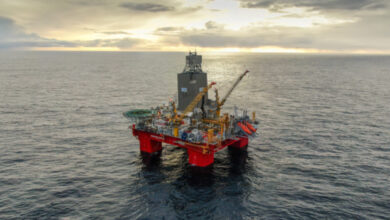University project allows students to learn about low-impact technologies first-hand
In the project, an independent operator was to drive five wells on their lease in South Texas in an environmentally sensitive wetland area. They provided well profiles for offset wells and asked students to create well plans using low-impact drilling technology so that the environment would be minimally affected.
The student teams then investigated technologies regarding environmental impact: low-impact footprint, lightweight rig/casing drilling; zero waste from rig site; and alternate rig power.
| Additional details about the Environmentally Friendly Drilling Systems program will be published in the March/April 2009 issue of Drilling Contractor. Also in the issue, read about Maersk Drilling’s Green Rig project, recently launched to pursue energy efficiency in daily operations. |
For low-impact footprint, portable roadway and heavy-duty flooring systems were studied by the students, as was the use of recycled drill site waste for road base material. The latter provided a way to re-use solid waste from drilling operations and would enable remediation (plowed into the soil after use and promote vegetative growth).
For lightweight rig/casing drilling, the team chose a lightweight top drive rig that enabled casing drilling operations and directional drilling.
Emissions from the diesel generator power packages is a big concern when drilling in sensitive areas. The students evaluated retrofit packages for conventional power, comparing four systems: diesel oxidation catalyst (DOC), diesel particulate filters (DPF), NOx absorber catalysts, and selective catalytic reduction (SCR).
Descriptions and costs for the systems were compared for the hypothetical lightweight rig, with each technology being assigned a “value” as measured by their ability to reduce emissions and their acceptance by the government, industry and the public.
To reduce waste from the rig site to zero, new technologies to recycle and reuse both liquid and solid waste from well operations were considered. Especially for this project, the need for minimal disruption of the coastal wetland was critical, and the students decided that controlling water discharge from the site, re-use of drilling solids, and minimization of truck transport to/from the well site was paramount.
The team opted to treat water at the rig site and to re-use well drill solids in a new road base material for access roads.
For alternate rig power, the two most cost-effective and ready options were to use engines that run on natural gas, or use diesel power re-equipped to reduce particulate and exhaust gas emissions. Natural gas engines was found to have superior attributes, but it also was more expensive. By using a less costly fuel, rig operations employing the more expensive natural gas power recoup a significant portion of the added expense of the natural gas fired engine.
Overall, Dr Schubert said, this class challenge was beneficial in that it allowed the students to learn first-hand about new technologies available to drilling contractors and operators. The landowners also learned about the cost benefit of certain technologies – though, in the end, some could not be justified based on expense, he said.
The exercise turned out to be a good “field test” of an EFD optimization system, with almost 60 students using the optimization model to select the most appropriate practices to include in their well designs. Finally, it resulted in a database of technologies that was populated with actual cost numbers and contact information. More than 100 different techniques had been identified, characterized and catalogued by the end of the study.
SPE/IADC 119297, “Well Design for Environmentally Friendly Drilling Systems: Using a Graduate Student Drilling Class Team Challenge to Identify Options for Reducing Impacts,” by DB Burnett, Ok-Youn Yu and JJ Schubert, Texas A&M University, was presented at the 2009 SPE/IADC Drilling Conference, 17-19 March, Amsterdam.




